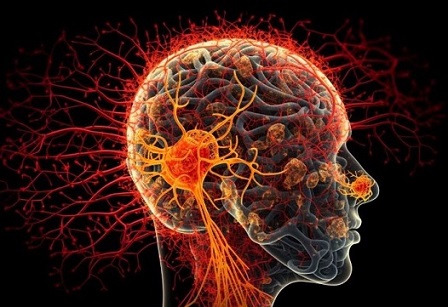Nikhil Prasad Fact checked by:Thailand Medical News Team Jul 31, 2024 8 months, 3 weeks, 5 days, 10 hours, 31 minutes ago
Medical News: A groundbreaking study conducted by researchers from the University of Modena and Reggio Emilia, the IRCCS Istituto delle Scienze Neurologiche di Bologna, and the University of Bologna has unveiled alarming findings about the potential neurotoxic effects of coronaviruses. This
Medical News report delves into their discovery that the human coronavirus OC43 (HCoV-OC43) can infect human neurons and astrocytes, leading to significant neurodegeneration. These findings suggest a potential link between coronavirus infections and the onset and progression of Alzheimer’s disease (AD).
 Italian researchers uncover neurotoxic effects of coronavirus
Coronavirus and the Brain
Italian researchers uncover neurotoxic effects of coronavirus
Coronavirus and the Brain
While COVID-19, caused by SARS-CoV-2, is primarily known for its respiratory impact, emerging evidence indicates that the virus can also reach the central nervous system (CNS), causing severe neurological disorders. This study specifically investigates how the human coronavirus OC43, a low-risk model for studying SARS-CoV-2, affects brain cells and contributes to neurodegenerative processes.
The Experiment: Studying Neurons and Glial Cells
The researchers used the SH-SY5Y cell line, which is commonly used in Alzheimer's disease studies, to examine how neurons react to coronavirus infection. These neurons were supplemented with exogenous fibrillary β-amyloid (Aβ) to mimic AD conditions. Additionally, human microglia (HMC3) and astrocytic (D54MG) cell lines were co-cultured with neurons to create a comprehensive model of the brain environment.
Key Findings: Neurotoxic Effects and Neurodegeneration
The study revealed that HCoV-OC43 can infect neurons and astrocytes, leading to significant neurotoxic effects. Unlike microglia, neurons and astrocytes showed susceptibility to the virus. Although the infection did not display immediate cytotoxic effects in neurons, it caused significant biochemical and morphological alterations over time, indicating that the neurons were under stress. These alterations included prodromal and neurodegenerative features characteristic of Alzheimer's disease.
Interaction of Infected Astrocytes and Neurons
One of the most intriguing findings was the interaction between infected astrocytes and neurons. The study observed that when astrocytes infected by HCoV-OC43 interacted with neurons, signs of neurodegeneration such as amyloid-beta deposition began to manifest. This interaction suggests that astrocytes play a critical role in the progression of neurodegenerative diseases when influenced by coronavirus infections.
Aggravating Effects in Alzheimer's Disease Model
Using exogenous fibrillary Aβ to create an in vitro model of Alzheimer's disease, the researchers found that coronavirus infection exacerbated both the infection itself and the progression of neurological disease. This aggravating effect indicates a potential causal relationship between c
oronavirus infections and the acceleration of Alzheimer's disease symptoms.
Implications for Therapeutic Approaches
Understanding the connection between Alzheimer's disease and coronavirus infections could pave the way for new therapeutic approaches. The study suggests that addressing coronavirus infections in the CNS might be crucial in managing and potentially slowing down the progression of Alzheimer's disease. This interplay between different CNS cell populations highlights the complexity of studying pathogenic effects and the necessity of considering multiple cell types to fully understand the disease mechanisms.
Conclusion and Future Directions
In conclusion, the study by the Italian researchers demonstrates a significant link between HCoV-OC43 infection and neurodegenerative processes. The co-presence of various CNS cell types is essential for studying these pathogenic effects in vitro, providing a more comprehensive understanding of the disease dynamics.
The study findings were published in the peer-reviewed journal: Experimental Neurology.
https://www.sciencedirect.com/science/article/abs/pii/S0014488624002346
For the latest
COVID-19 News, keep on logging to Thailand Medical News.
Read Also:
https://www.thailandmedical.news/news/u-s-study-finds-that-sars-cov-2-invades-the-peripheral-sensory-neurons-first-before-spreading-through-the-bloodstream
https://www.thailandmedical.news/news/the-neurobiological-link-between-sleep-glymphatic-dysfunction-and-neurodegeneration
